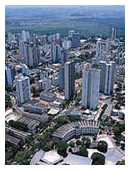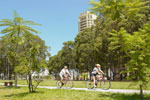
- :: Home
- :: Organizing Committee
- :: Sponsors
- :: Technical Topics
- :: Scientific Program
- :: Invited Speakers
- :: Important Dates
- :: Registration
- :: Registered Participants
- :: Abstract Submission
- :: Proceedings Publication
- :: Poster Instrucions
- :: Hotel Reservation
- :: Visa Informations
- :: Arriving Brazil
- :: Local Guide / Tours
- :: Previous Conferences
- :: Photos
- :: Contact Us
Local Guide / Tours
 |
The Workshop will take place at the Conference Center of INPE and will be held on September 7-11, 2009. Beautifully located in the valley of the Paraiba do Sul River, São José dos Campos is a major city in the state of São Paulo, Brazil. It lies about 120 km East from Sao Paulo; it is cut across by Via Dutra, the highway which connects Rio de Janeiro (320 km Northeast) and Sao Paulo, the two most important Brazilian cities. São José dos Campos has a pivotal role as research center in Brazil. The National Institute for Space Research (INPE) coordinates intensive research and development in areas such as Earth observation, space sciences and space technologies. Also the Brazilian General Command for Aerospace Technology (CTA) has its facilities in the city. There are 53 secondary schools, and 14 universities and colleges in the valley. This combination of privileged localization and presence of skilled work force contributed to turn Sao Jose dos Campos into one of the most important industrial and technological cities in Brazil. Embraer and most of Brazilian aerospace companies are here. |
The population has an average income much higher than Brazil; an infrastructure of commerce and services was created to cater for both these local consumers and the growing number of visitors.
A complete urban infrastructure and a planned industrial park, put São José on the list of investors, executives and professionals who opt for standard and high quality of life. São José is among the 25 cities in the country with the better conditions of living, according to the UN and among 9 best to do business, according to Exame magazine. The city has an extensive green area with parks, ecological reserves and Alpine regions. About 60% of the territory of the municipality is regarded area of environmental protection.
All economic and cultural factors put San Jose as an important commercial centre of a region with nearly two million inhabitants, formed by the Vale do Paraiba, Litoral Norte, Serra da Mantiqueira and Vale Histórico.
Climate
The climate is humid and subtropical , with the dry season in winter. In the summer, the average maximum temperature is 29 °C and in the winter, the average minimum temperature is 12°C. The average annual temperature is 20 °C. The best season of the year is the spring (September - November) with average temperature of about 24ºC.

Language
The official language in Brazil is Portuguese, with different regional accents characterizing each states, Spanish and English are spoken in some areas, especially in hotels, shops, restaurants, and other tourist spots.
Time
Brazil spans several time zones: Eastern Standard time: GMT - (GMT - 2 from third Sunday in October to third Saturday in March). Third is the main zone. São Paulo, Rio de Janeiro and São José dos Campos are among this time zone. -North East States and East Pará time: GMT - 3. -Western Standard time: GMT - 4 (GMT - 3 from third Sunday in October to third Saturday in March). -Amapa and West Pará Time: GMT - 4. -Acre State: GMT - 5. -Fernando de Noronha Archipelago: GMT - 2.
Currency
The Brazilian currency is the "Real" and is divided in "100 centavos". The official rate of exchange is published daily in the main Brazilian newspaper. Foreign currencies or travelers checks can be exchanged for Reais at Hotels, banks and tourism agencies. Credit Cards All major credit Cards are accepted everywhere, but in some places such as small markets, videos stores, small places where you usually do not spend much, it is only accepted cash or check.
Holidays
Business holidays include New Year's Day (1 January), Carnival (February or March; dates vary), Easter and Good Friday (March or April; dates vary), Tiradentes Day (21 April), Labor Day (1 may), Corpus Christi (June; dates varies), independence Day (7 September), Our lady Aparecida Day (12 October), All Soul's Day (2 November), proclamation of the Republic Day (15 November), and Christmas Day (25 December).
Religion
Brazil is officially a Catholic country. Over 90% of Brazilians are Roman Catholics and 5% of the population is Protestant. Indian animism was the original spiritual practice in Brazil. It greatly declined when the Catholic Portuguese settlers colonized Brazil, but some still remains. Slaves from Africa that were brought to Brazil had their own religions. The Catholics banned these religions. Some Afro-Brazilian cults evolved during that time, but they are of no resemblance to those of the mainstream religions in Brazil.
How to get there.

Copyright 2011© INPE - Instituto Nacional de Pesquisas Espaciais.
 INPE
INPE


